 I cannot be
I cannot beintellectual
because
when I sin
I am out
of the mind
You gave me.
From my cell, I bring you whatever is on my mind.
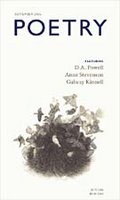
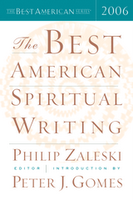 Finished reading The Best American Spiritual Writing. This seems to be an eclectic mix of genres that in some general way are about spirituality. Actually, most of the pieces seem to be personal essays and poetry, so I was mostly right at home. After wading through the forward and introduction, I found myself reading through "The Gift of the Call," an essay that might have had more resonance with me had I expected a personal testimony. Not a great start, but then I read "The Acusmata of Pythagoras" by Brian Blanchfield. Here, if nothing else, was something new. When I got to "Best of Intentions" by Harvey Cox (after some thoughtful poems), I was a little more into the book. I may have been biased at his focus on teaching and tolerance, but I think this piece is worth reading. "Sighs Too Deep for Words" is an honest account of Helen Gardner's spiritual journey summed up well by the subtitle: "On Being Bad at Reading the Bible."After a few more okay, but not terribly memorable essays, I found myself reading two moving pieces, Todd Gitlin's "A Skull in Varanasi, a Head in Baghdad" and "When the Candle Is Blown Out," by Natalie Goldberg. I liked reading, after these, the meditation on suicide bombers by Mary Gordon called "Appetite for the Absolute." I don't think I understood what I believe is the only short story in the collection, "Dr. King's Refrigerator" by Charles Johnson. I did like the essay "High Fidelity" by Bill McKibben about people who stay through many changes in their church over the course of their long lives. "Kierkegaard for Grownups," by Richard John Neuhaus, is particularly interesting and informative. I am still at a loss to understand the inclusion of Oliver Sacks' essay "Speed." I had read it before in the Best American Essays volume, and reading it again helped me appreciate it more, but I didn't see it as a spiritual piece of writing, even in the broadest sense. On the other hand, I found Huston Smith's "The Master-Disciple Relationship" and Kenneth L. Woodward's "The Passion's Passionate Despisers" to be thought provoking.
Finished reading The Best American Spiritual Writing. This seems to be an eclectic mix of genres that in some general way are about spirituality. Actually, most of the pieces seem to be personal essays and poetry, so I was mostly right at home. After wading through the forward and introduction, I found myself reading through "The Gift of the Call," an essay that might have had more resonance with me had I expected a personal testimony. Not a great start, but then I read "The Acusmata of Pythagoras" by Brian Blanchfield. Here, if nothing else, was something new. When I got to "Best of Intentions" by Harvey Cox (after some thoughtful poems), I was a little more into the book. I may have been biased at his focus on teaching and tolerance, but I think this piece is worth reading. "Sighs Too Deep for Words" is an honest account of Helen Gardner's spiritual journey summed up well by the subtitle: "On Being Bad at Reading the Bible."After a few more okay, but not terribly memorable essays, I found myself reading two moving pieces, Todd Gitlin's "A Skull in Varanasi, a Head in Baghdad" and "When the Candle Is Blown Out," by Natalie Goldberg. I liked reading, after these, the meditation on suicide bombers by Mary Gordon called "Appetite for the Absolute." I don't think I understood what I believe is the only short story in the collection, "Dr. King's Refrigerator" by Charles Johnson. I did like the essay "High Fidelity" by Bill McKibben about people who stay through many changes in their church over the course of their long lives. "Kierkegaard for Grownups," by Richard John Neuhaus, is particularly interesting and informative. I am still at a loss to understand the inclusion of Oliver Sacks' essay "Speed." I had read it before in the Best American Essays volume, and reading it again helped me appreciate it more, but I didn't see it as a spiritual piece of writing, even in the broadest sense. On the other hand, I found Huston Smith's "The Master-Disciple Relationship" and Kenneth L. Woodward's "The Passion's Passionate Despisers" to be thought provoking.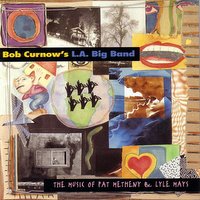
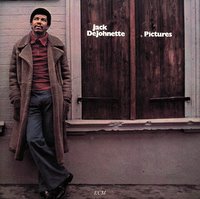 free jazz or ambient type sections might be offputting, but I think this project is worth a listen. It is also nice to see DeJohnette the keyboardist, one who may not knock your socks off with amazing playing, but his sense of melody will show the discerning listener why he is such a great drummer.
free jazz or ambient type sections might be offputting, but I think this project is worth a listen. It is also nice to see DeJohnette the keyboardist, one who may not knock your socks off with amazing playing, but his sense of melody will show the discerning listener why he is such a great drummer.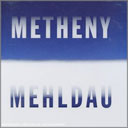 The highlight of my musical month has to be the first release of a collaboration between Pat Metheny and Brad Mehldau (Metheny mentioned in his podcast that another disc would come out early next year). I am not surprised by how much I like this disc. What is nice is that there seems to be a real collaboration of performance. Most of the tunes were composed by Metheny, but Mehldau doesn't sound like a substitute for Lyle Mays. Both players' individual voices are clear here without drowning out the other. Most of the tunes are performed by only Metheny and Mehldau; however two songs come with Mehldau's bassist and drummer. (Metheny says the next disc will be more quartet oriented.)Two of the songs were previously recorded: Mehldau's "Unrequited" and Metheny's " Say The Brother's Name." The new versions are fine, neither improving or diminishing the earlier performances. Standout cuts are, "Ring of Life" and "Make Peace." But everything on this disc is good.
The highlight of my musical month has to be the first release of a collaboration between Pat Metheny and Brad Mehldau (Metheny mentioned in his podcast that another disc would come out early next year). I am not surprised by how much I like this disc. What is nice is that there seems to be a real collaboration of performance. Most of the tunes were composed by Metheny, but Mehldau doesn't sound like a substitute for Lyle Mays. Both players' individual voices are clear here without drowning out the other. Most of the tunes are performed by only Metheny and Mehldau; however two songs come with Mehldau's bassist and drummer. (Metheny says the next disc will be more quartet oriented.)Two of the songs were previously recorded: Mehldau's "Unrequited" and Metheny's " Say The Brother's Name." The new versions are fine, neither improving or diminishing the earlier performances. Standout cuts are, "Ring of Life" and "Make Peace." But everything on this disc is good.